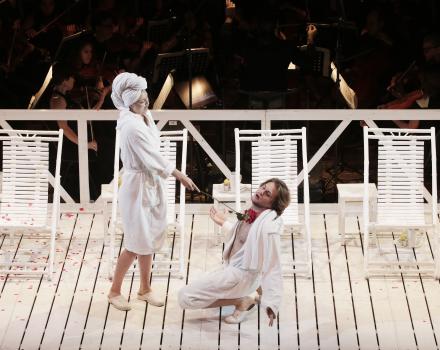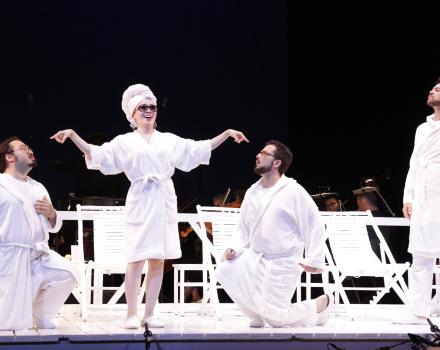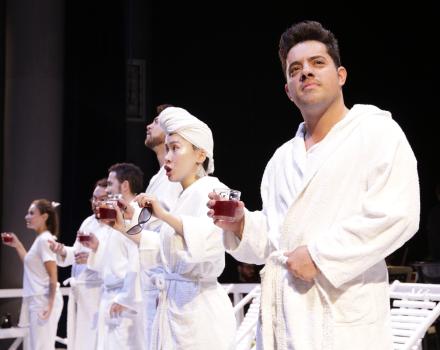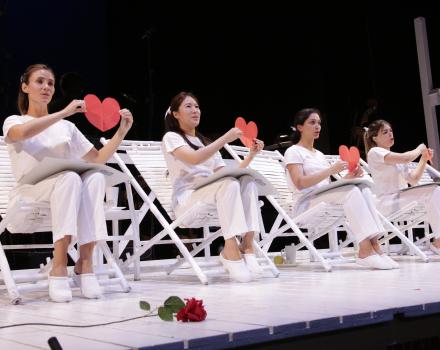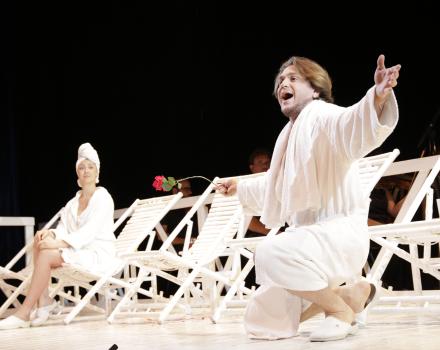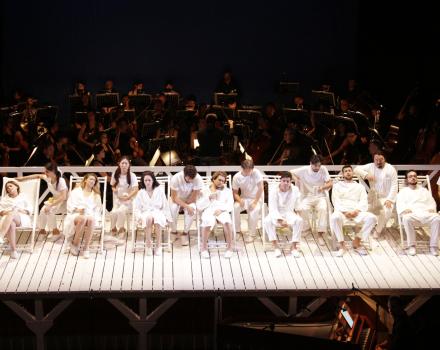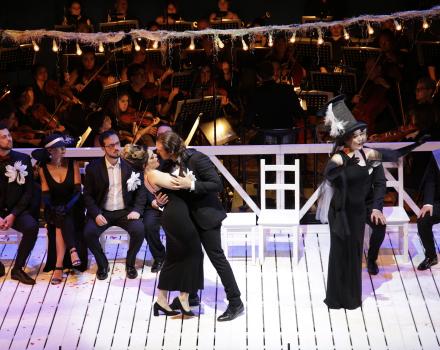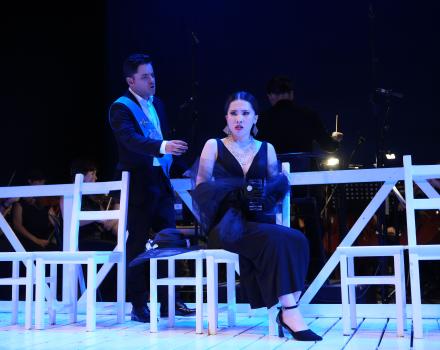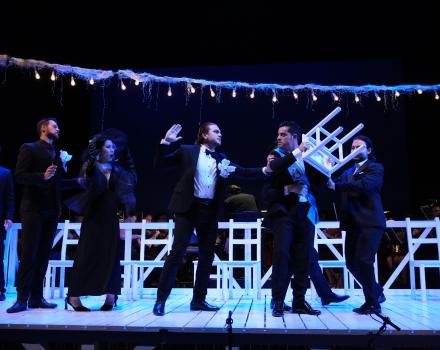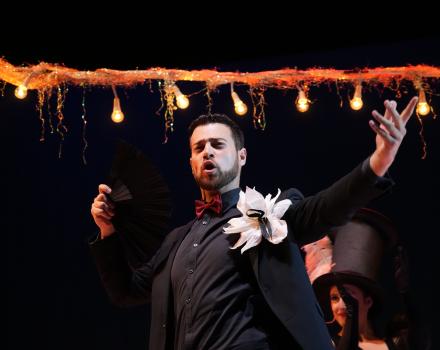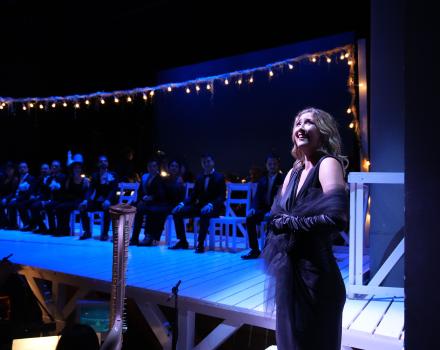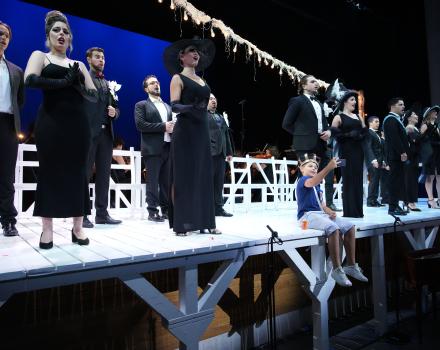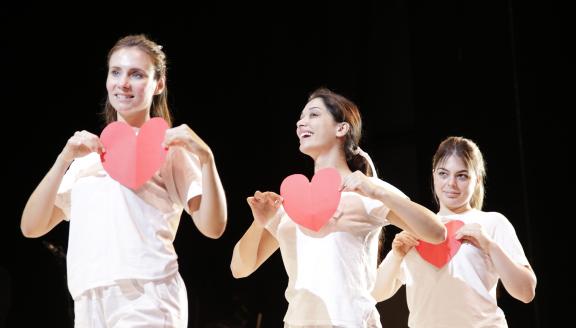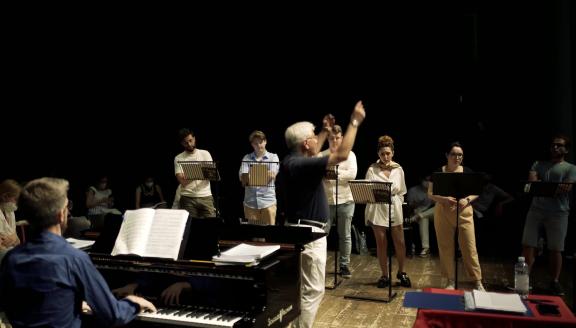At the Inn of the Golden Lily, the most illustrious figures in Europe converge to celebrate a royal French coronation. But between lost luggage, missing horses, and some amorous antics, nothing will happen as planned.
Il viaggio a Reims was Rossini’s last Italian opera and the first he wrote in France for its Paris premiere in 1825 as part of the festivities for the coronation of Charles X. Conceived for the greatest voices of the time, the opera requires an exceptional cast: three prima donna sopranos, an alto, two tenors, and four baritones and basses have leading roles. For Rossini Opera Festival’s Accademia in Pesaro, Il viaggio a Reims has become an annual summer showcase for the next generation of bel canto singers. Founded by the conductor Alberto Zedda, the Accademia Rossiniana has an international reputation for training young Rossini voices. One former student, Juan Diego Flórez, is not only one of the world’s leading tenors but the new artistic director of the Rossini Opera Festival itself. Emilio Sagi’s production provides a beautiful platform on which young artists can shine. Following the success of last year’s stream, OperaVision returns to Pesaro where two new young casts with perform Il viaggio a Reims. The first will be live on 18 August at 11am, the second available a few days later.
Cast A
18 August 2023
|
Corinna
|
Martina Russomanno
|
|---|---|
|
Marchesa Melibea
|
Saori Sugiyama
|
|
Contessa di Folleville
|
Vittoriana de Amicis
|
|
Madama Cortese
|
Maria Rita Combattelli
|
|
Cavalier Belfiore
|
Paolo Nevi
|
|
Conte di Libenskof
|
Pietro Adaíni
|
|
Lord Sidney
|
Giacomo Nanni
|
|
Don Profondo
|
Giuseppe Toia
|
|
Barone di Trombonok
|
Andrés Cascante
|
|
Don Alvaro
|
Matteo Mancini
|
|
Don Prudenzio
|
Omar Cepparolli
|
|
Don Luigino
|
Michele Galbiati
|
|
Delia
|
Sabrina Gárdez
|
|
Maddalena
|
Seray Pinar
|
|
Modestina
|
Miyoung Lee
|
|
Antonio
|
Valerio Morelli
|
|
Zefirino/Gelsomino
|
Luigi Morassi
|
|
Orchestra
|
Filarmonica Gioachino Rossini
|
| ... | |
|
Music
|
Gioachino Rossini
|
|---|---|
|
Text
|
Luigi Balocchi
|
|
Conductor
|
Andrea Foti
|
|
Director
|
Emilio Sagi
|
|
Revival director
|
Matteo Anselmi
|
|
Costumes
|
Pepa Ojanguren
|
|
Lighting
|
Fabio Rossi
|
| ... | |
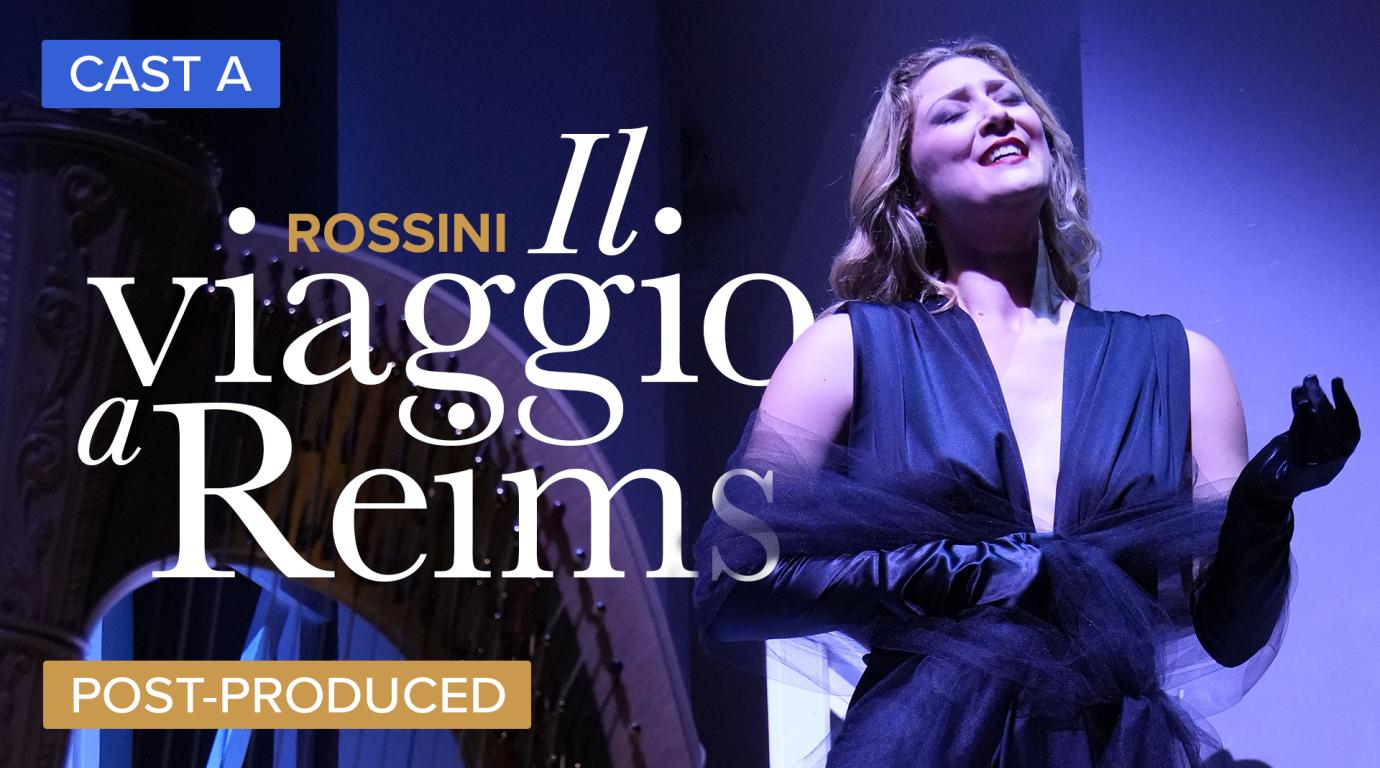
Cast B
16 August 2023
|
Corinna
|
Tamar Otanadze
|
|---|---|
|
Marchesa Melibea
|
Seray Pinar
|
|
Contessa di Folleville
|
Miyoung Lee
|
|
Madama Cortese
|
Sabrina Gárdez
|
|
Cavalier Belfiore
|
Paolo Nevi
|
|
Conte di Libenskof
|
Pietro Adaíni
|
|
Lord Sidney
|
Alberto Comes
|
|
Don Profondo
|
Eduardo Martinez
|
|
Barone di Trombonok
|
Valerio Morelli
|
|
Don Alvaro
|
William Kyle
|
|
Don Prudenzio
|
Omar Cepparolli
|
|
Don Luigino
|
Michele Galbiati
|
|
Delia
|
Maria Rita Combattelli
|
|
Maddalena
|
Saori Sugiyama
|
|
Modestina
|
Vittoriana de Amicis
|
|
Zefirino/Gelsomino
|
Andrés Cascante
|
|
Antonio
|
Xavier Prado
|
|
Orchestra
|
Filarmonica Gioachino Rossini
|
| ... | |
|
Music
|
Gioachino Rossini
|
|---|---|
|
Text
|
Luigi Balocchi
|
|
Conductor
|
Andrea Foti
|
|
Director
|
Emilio Sagi
|
|
Revival director
|
Matteo Anselmi
|
|
Costumes
|
Pepa Ojanguren
|
|
Lighting
|
Fabio Rossi
|
| ... | |
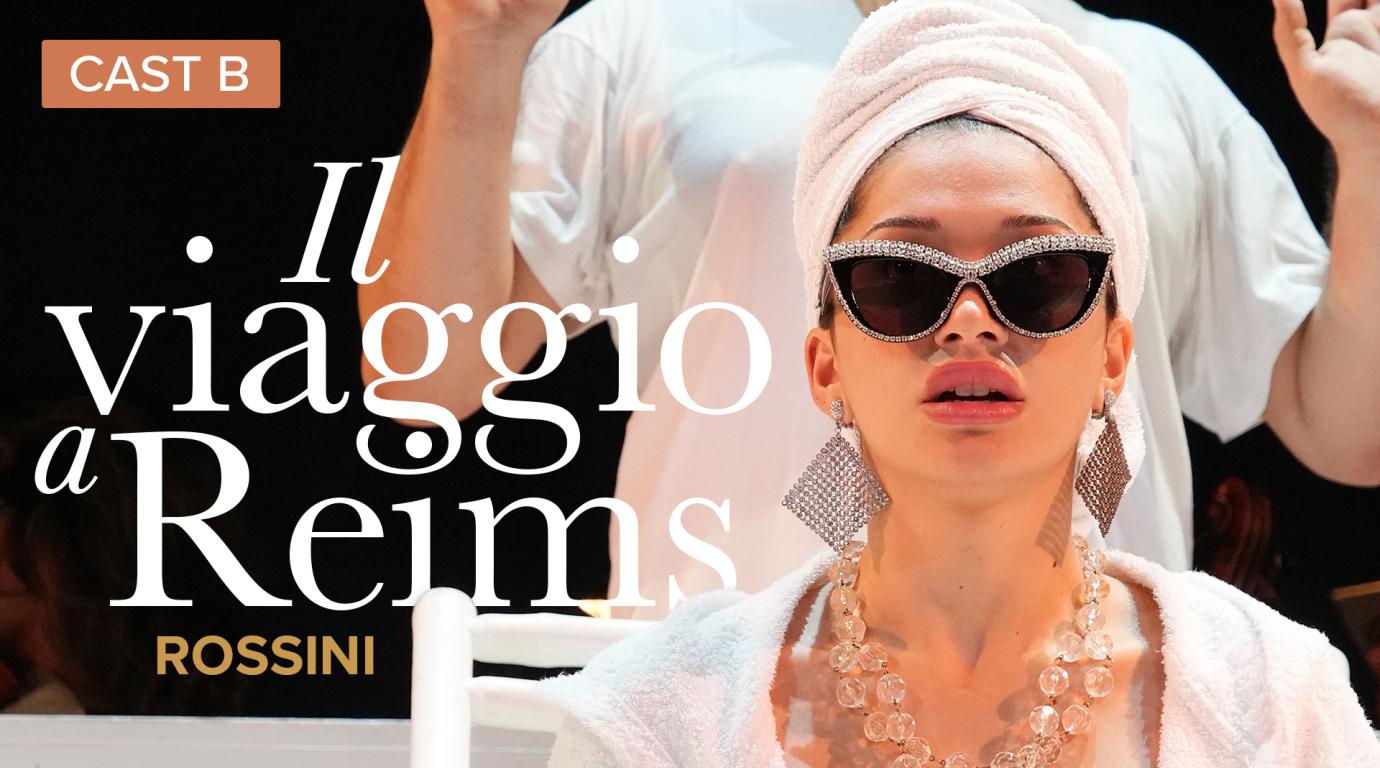
Videos
STORY
Madama Cortese, proprietress of the “Golden Lily” Inn, a bathing establishment at Plombières, urges her staff to hurry up and help in the preparations for the journey to Reims that her guests are about to undertake that very evening, in order to be present at the coronation of the new King, Charles X, which will take place – according to tradition – in that city.
After Don Prudenzio, the doctor of the establishment, has carefully examined the breakfasts prepared for the guests, to check that they correspond to his orders, and after Madama Cortese has once more spurred the servants on to busy themselves in the interests of the good name of the hotel, the Contessa di Folleville comes on: she is a pretty Parisienne, crazy about fashion, beloved of the Cavalier Belfiore, a brave French officer.
The Contessa is worried because the dresses she is planning to wear at the great festivities have still not arrived. Don Luigino, a cousin of the Contessa di Folleville whose job it was to go and pick up the dresses, comes in to tell her that the coach carrying the Contessa’s personal effects has been overturned, damaging its precious cargo of boxes and trunks. Upon
hearing this news the Countess faints, attracting the attention of the other hotel guests, who try to revive her. The anguished lady comes back to life again when her maid, Modestina, comes in carrying a large box that has been unexpectedly saved from the disastrous accident to the carriage; to have saved one precious hat from the carnage puts her into the right mood for the festivities.
Meanwhile Baron Trombonok, a German officer who is mad about music and whom the other hotel guests have elected treasurer for their journey, makes his final arrangements with Antonio, the manager of the hotel, entrusting him with seeing to the baggage and any other requirements of the travellers. Onto the stage now come Don Profondo, a man of letters, member of more than one academy, a maniacal collector of antiques, and Don Alvaro, Grandee of Spain, who introduces to the Baron the Marchesa Melibea, a lovely Polish lady, widow of an Italian general, and with whom he is in love; the lady wishes to undertake the journey to Reims together with the other illustrious guests of the Inn. Don Alvaro’s jealousy is aroused by the arrival of the Conte di Libenskof, a Russian gentleman who is also in love with Melibea, and the rivalry between the two claimants to her hand is openly declared in the presence of Melibea and Madama Cortese, but suddenly these fiery jealous spirits are quietened by the sound, floating from offstage, of Corinna, a young Roman girl also staying at the Inn, singing one of her poetic improvisations. Madama Cortese is worried about the late return of Zefirino, the messenger whom she has sent in search of horses for the journey, and she also makes some pithy observations about a case of true love, reciprocal but not openly declared, between her English guest, Lord Sidney, and Corinna.
Lord Sidney comes on, lovelorn and suffering, and Corinna, to whom Don Profondo has handed a letter, reads it out: it contains comforting news for Delia, a Greek orphan girl to whom Corinna is attached, about the condition of her native land, and invites the poetess to take part in the journey to Reims with the others. Finally she notices the flowers that have been left in her room, a daily token of love from Lord Sidney.
The Cavalier Belfiore, finding the poetess alone, tries to woo and win her, quite sure that his past experience as an irresistible seducer will stand him in good stead. Don Profondo breaks in upon them and makes fun of the unfortunate wooer, then gets ready to compile the catalogue of valuables belonging to the travellers that the Baron has asked him for.
After a rapid and witty exchange of words between Don Profondo and the Contessa di Folleville, who has guessed that her own Cavalier Belfiore has been flirting with Corinna, various guests betray their impatience to be off, but they are all dismayed by the arrival of the Baron with Zefirino: they will not be able to undertake their journey because in all Plombières there is not a single horse to be found for hire or for purchase, because of the vast numbers of other travellers who are going to Reims for the coronation.
Madama Cortese cheers everybody up by showing her guests a letter that she has received from her husband in Paris, describing the great festivities that are being planned in the capital to honour the new King on his return from his coronation: this offers them a most agreeable opportunity to console themselves for not being able to travel to Reims. The Contessa di Folleville offers hospitality to the entire company in her Paris house; everyone accepts the proposal with enthusiasm, and they decide to leave the next day by means of the regular daily coach connecting Plombières with the capital. That very evening, using some of the money they had collected and set aside to meet the expenses of their journey to Reims, they will organise a party, to which all are invited, to celebrate the King’s coronation in a different way, and the money left over will be given to charity. The problem has been solved, therefore, and the Baron also tries to heal the breach between the Conte di Libenskof and the Polish Marchesa, caused by Don Alvaro. The two lovers make their peace and then the scene changes to the illuminated garden of the hotel, in which a richly decorated table has been laid. The manager, Antonio, learns from Maddalena, the housekeeper, that the Baron has engaged a band of travelling dancers and musicians, who happened to be passing that way, to amuse the company; soon afterwards these come on, opening the festivities with their dancing and singing.
The Baron, as required by tradition and as had been previously arranged, announces a series of drinking songs, or toasts, in the musical styles of the various nationalities of the guests, in honour of the King and the royal family. At last everyone present joins in requesting, as a worthy conclusion to the festivities, a poetic improvisation by Corinna. The guests, therefore, propose various different themes for the poetess’s improvisation, largely drawn from French history, from which Melibea draws (as in a lottery) that of “Charles X, King of France”.
After Corinna’s musical tribute, and amidst loyal cheering to the King and to France, the performance comes to an end with an apotheosis of the royal family.
Gallery
